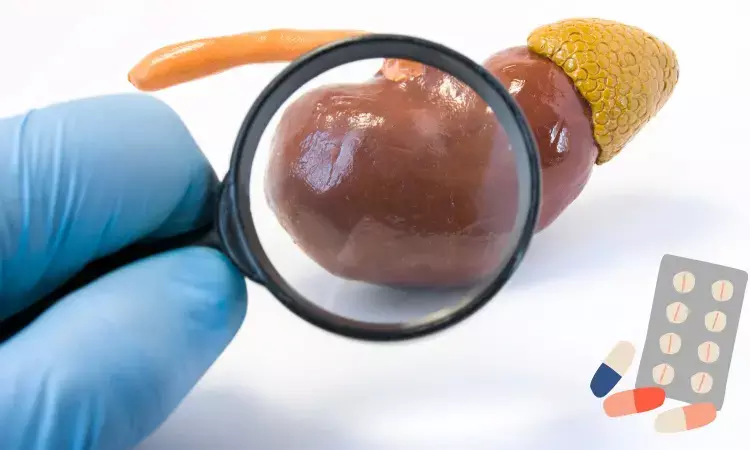- Home
- Medical news & Guidelines
- Anesthesiology
- Cardiology and CTVS
- Critical Care
- Dentistry
- Dermatology
- Diabetes and Endocrinology
- ENT
- Gastroenterology
- Medicine
- Nephrology
- Neurology
- Obstretics-Gynaecology
- Oncology
- Ophthalmology
- Orthopaedics
- Pediatrics-Neonatology
- Psychiatry
- Pulmonology
- Radiology
- Surgery
- Urology
- Laboratory Medicine
- Diet
- Nursing
- Paramedical
- Physiotherapy
- Health news
- Fact Check
- Bone Health Fact Check
- Brain Health Fact Check
- Cancer Related Fact Check
- Child Care Fact Check
- Dental and oral health fact check
- Diabetes and metabolic health fact check
- Diet and Nutrition Fact Check
- Eye and ENT Care Fact Check
- Fitness fact check
- Gut health fact check
- Heart health fact check
- Kidney health fact check
- Medical education fact check
- Men's health fact check
- Respiratory fact check
- Skin and hair care fact check
- Vaccine and Immunization fact check
- Women's health fact check
- AYUSH
- State News
- Andaman and Nicobar Islands
- Andhra Pradesh
- Arunachal Pradesh
- Assam
- Bihar
- Chandigarh
- Chattisgarh
- Dadra and Nagar Haveli
- Daman and Diu
- Delhi
- Goa
- Gujarat
- Haryana
- Himachal Pradesh
- Jammu & Kashmir
- Jharkhand
- Karnataka
- Kerala
- Ladakh
- Lakshadweep
- Madhya Pradesh
- Maharashtra
- Manipur
- Meghalaya
- Mizoram
- Nagaland
- Odisha
- Puducherry
- Punjab
- Rajasthan
- Sikkim
- Tamil Nadu
- Telangana
- Tripura
- Uttar Pradesh
- Uttrakhand
- West Bengal
- Medical Education
- Industry
Sparsentan reduces proteinuria in IgA nephropathy patients: Lancet

A study published in The Lancet has concluded that in adults with a history of IgA nephropathy, Once-daily treatment with sparsentan reduces proteinuria.
Explaining the study background, researchers said that Sparsentan is a non-immunosuppressive, dual endothelin and angiotensin receptor antagonist. This novel single-molecule is under research in a phase 3 trial in adults with IgA nephropathy.
PROTECT trial is conducted in 134 clinical practice sites in nearly 18 countries. The study examines sparsentan versus irbesartan in adults with biopsy-proven IgA nephropathy and proteinuria (1·0 g/day or higher).
Participants were randomly assigned and received 400 mg sparsentan 400 mg or 300 mg irbesartan once daily [(stratified by eGFR (30 to <60 mL/min per 1·73 m2 and ≥60 mL/min per 1·73 m2) and urine protein excretion (≤1·75 g/day and >1·75 g/day) at screening.]
Change in urine protein-creatinine ratio (from baseline to week 36 ) was the primary efficacy endpoint measured in the study.
Treatment-emergent adverse events (TEAEs) were safety endpoints.
The key findings of the study are:
- Four hundred four participants were randomly assigned.
- Two hundred two participants each were assigned to sparsentan and irbesartan.
- At week 36, the geometric least squares mean percent change in urine protein-creatinine ratio was higher in the sparsentan group (-49·8%) than in the irbesartan group (-15·1%).
- The between-group relative reduction of 41% was reported.
- There were similarities in TEAEs with sparsentan and irbesartan.
- Severe oedema, heart failure, hepatotoxicity, or oedema-related discontinuations were not reported.
- There was no difference in Bodyweight changes between the sparsentan and irbesartan groups.
Concluding further, Once-daily treatment with sparsentan reduces proteinuria in adults with IgA nephropathy.
Based on the study results, there were similarities in the Safety of sparsentan and irbesartan.
They added, “Future analyses after the 2-year double-blind period will answer more questions related to translating these beneficial effects into a long-term nephroprotective potential of sparsentan.”
As acknowledged, the study received funding from Travere Therapeutics.
Further reading:
Heerspink HJL, Radhakrishnan J, Alpers CE, Barratt J, Bieler S, Diva U, Inrig J, Komers R, Mercer A, Noronha IL, Rheault MN, Rote W, Rovin B, Trachtman H, Trimarchi H, Wong MG, Perkovic V; PROTECT Investigators. Sparsentan in patients with IgA nephropathy: a prespecified interim analysis from a randomised, double-blind, active-controlled clinical trial. Lancet. 2023 May 13;401(10388):1584-1594. doi: 10.1016/S0140-6736(23)00569-X.
BDS, MDS in Periodontics and Implantology
Dr. Aditi Yadav is a BDS, MDS in Periodontics and Implantology. She has a clinical experience of 5 years as a laser dental surgeon. She also has a Diploma in clinical research and pharmacovigilance and is a Certified data scientist. She is currently working as a content developer in e-health services. Dr. Yadav has a keen interest in Medical Journalism and is actively involved in Medical Research writing.
Dr Kamal Kant Kohli-MBBS, DTCD- a chest specialist with more than 30 years of practice and a flair for writing clinical articles, Dr Kamal Kant Kohli joined Medical Dialogues as a Chief Editor of Medical News. Besides writing articles, as an editor, he proofreads and verifies all the medical content published on Medical Dialogues including those coming from journals, studies,medical conferences,guidelines etc. Email: drkohli@medicaldialogues.in. Contact no. 011-43720751


